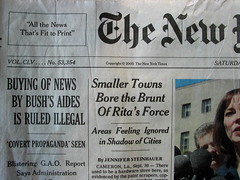
BUYING OF NEWS BY BUSH'S AIDES IS RULED ILLEGAL - "Covert Propaganda"
Originally uploaded by Antifluff Superstar.
And the Pentagon has been spending Millions for years now on "covert progaganda". This was especially wrong when those millions were first discovered being spent right after Katrina devastated New Orleans. And we all know how Bush handled that. So, let's be clear: Bush is spending your tax dollars to advertise and support the justifcation of an illegal war that has taken the lives of hundreds of thousands of civilian men, women and children. For freedom of course. At what point does this paradox become a war crime?
Washington Post: EDITORIAL
Planted Propaganda
It's a bad idea, whether or not it violates regulations. Too bad the Pentagon won't say that.
Monday, October 23, 2006; Page A20
THE DEFENSE Department inspector general has concluded that having a Pentagon contractor secretly pay Iraqi journalists and news organizations to run positive news stories about the war doesn't violate any laws or regulations. It's almost impossible to tell whether that conclusion is correct: The scanty, two-page summary released by the Pentagon provides no details about the activities of the contractor, the Lincoln Group, the contract under which it was operating or the applicable rules.
We won't dwell too long, though, on the irony that an assessment of the military's secret propaganda operations is itself -- except for the largely exculpatory conclusion -- secret. The more important point is that, assuming the inspector general's legal assessment is right, it only makes the problem worse. The U.S. government has a legitimate interest in conveying its point of view. The problem is when it does so in secret. The government shouldn't be in the business of covertly peddling propaganda -- especially in a war based on the notion of seeking to export democratic values such as, say, a free press.
But don't just take it from us. Take it from, among others, the chairman of the Joint Chiefs of Staff, Gen. Peter Pace, who criticized the program in comments to the Los Angeles Times in March. "I think there are ways to get your message out, but get it out in a form that people understand how the message got there," Gen. Pace said. "They need to know that, so they can make their own judgment about what they believe and don't believe in the article. The worst thing you can have is people feeling like somehow they've been snookered."
Or take it from Defense Secretary Donald M. Rumsfeld, who told PBS's Charlie Rose in February, "When we heard about it, we said, 'Gee, that's not what we ought to be doing.' " Or take it from Mr. Rumsfeld's former chief spokesman, Lawrence Di Rita, who said in December of the inspector general's investigation, "If somebody comes back to me and says there's nothing wrong with the Department of Defense paying journalists, I'll say, 'Even if there's nothing wrong, does it make sense?' "
No, it doesn't. But when we called the Pentagon to determine its policy position, the response we received -- even after citing the statements of Mr. Rumsfeld and Gen. Pace -- reflected no understanding of that bedrock principle. "The current situation in Iraq necessitates that the coalition maintain the capability to communicate with the Iraqi people via the Iraqi media," the statement said. "A thorough investigation concluded that the U.S. followed established doctrine by paying to place truthful articles and advertisements in Iraqi newspapers. The IG report made no recommendations to the contrary." But making recommendations wasn't the inspector general's job. If this is "established doctrine," it needs swift reexamination.

No comments:
Post a Comment